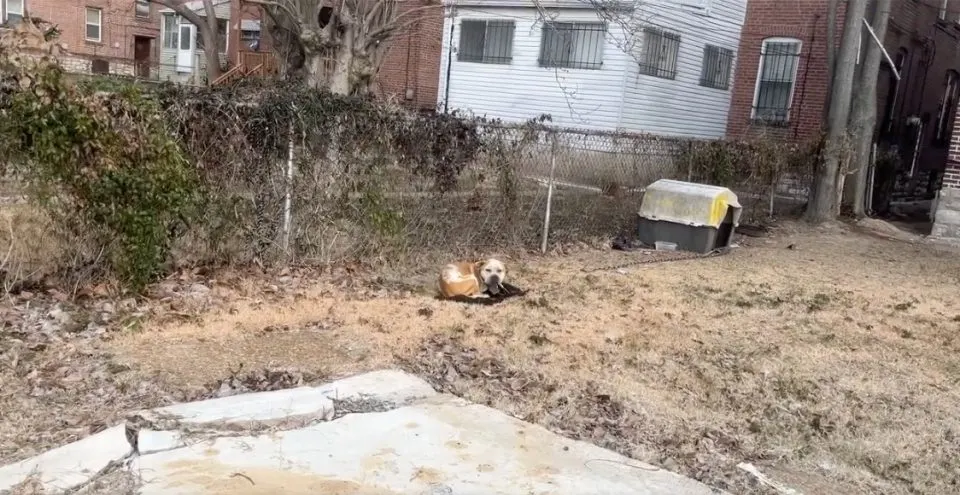Winters in St. Louis, Missouri, can be quite brutal, with temperatures dropping to the single digits, which is just terrible for stray animals.
That’s where the dedicated team at Stray Rescue of St. Louis (SRSL) comes in. They tirelessly comb the city for dogs in distress, especially during those bone-chilling January days.
During one of their searches, they happened to come across an abandoned house. Upon closer inspection, they discovered a little soul left behind, desperately in need of their immediate assistance.
Saved By The Bell

As SRSL rescuers pulled up to an abandoned house during their search, they expected to find just that – an abandoned house. However, they quickly realized that one soul was left behind in the backyard.
To their disbelief, an adorable dog who was once a family member was left behind chained to a doghouse full of frozen water.
He was curled up on the grass and shivering from the harsh weather. “The cold wind howled and the cold hurt after being outside for just a few moments. The callousness of this act alone gives us chills,” Stray Rescue of St. Louis wrote on Facebook.
Donna Lochmann, one of the compassionate SRSL rescuers, was heartbroken to see this poor dog abandoned in such a manner.
“Why someone felt you deserved to suffer with that huge chain is one of the world’s greatest mysteries. You’re free,” SRSL wrote.
The moment the dog – affectionately named Eskimo Joe – saw the people approaching him, he knew that they were there to rescue him.
He greeted Donna with a wagging tail and pressed his body against her as they used bolt cutters to set him free.
Eskimo Joe had suffered a lot, clinging desperately to life without water and food, but all that hardship was finally in the past because he was on his way to a secure haven, thanks to the compassionate efforts of SRSL.
Donna scooped him up and placed him in her warm Jeep for his freedom ride.

“He stared at Donna during his freedom ride and loved the heated seats,” Stray Rescue of St. Louis wrote.
At A Foster Home

Following his liberating journey, Eskimo Joe met the veterinary team from the rescue, who conducted a comprehensive checkup.
Unfortunately, he tested positive for heartworm, but the good news is that it’s a condition easily treatable with the right medication.
The rescue quickly noticed that Eskimo Joe was nothing but a kind and gentle soul, which resulted in him swiftly finding the perfect foster home.

His foster mom told SRSL, “He is the most gentle soul I have ever met. He is crate trained, potty trained, and loves to go for walks. He is a polite boy, he sits for food/treats, loves a good chin scratch, and has quickly become a cuddly couch buddy.”
Eskimo Joe already looks completely different from when he was found chained behind the abandoned house.
Although he’s still looking for a forever home, he’s enjoying all the cuddles and love he gets from his wonderful foster family.
I’m sure that he’ll find his family soon.

“He is genuinely curious of the world around him and will need walks/time outside to quietly observe now that he’s free from his chain. This guy is as sweet as can be and deserves nothing but the best! Let’s find his forever home, he’s so ready,” said his foster mom.
If you are interested in adopting Eskimo Joe or another dog at Stray Rescue of St. Louis, visit here.
If you’ve ever been greeted by a puddle of your furry friend’s vomit, you know it’s not the most pleasant sight. Dogs throwing up can be concerning and messy, but it’s a common occurrence that can have various causes. As a seasoned dog enthusiast, you’re aware that understanding why dogs vomit is crucial for their well-being.
From dietary indiscretions to underlying health issues, there’s a range of reasons why your canine companion may toss their cookies. As someone who values their pet’s health and happiness, delving into the reasons behind this messy behavior can help you better care for your four-legged friend. So, grab a treat for your pup and let’s sniff out the reasons why dogs sometimes toss their kibble.
Understanding the Canine Stomach
Common Causes of Vomiting in Dogs
When it comes to why dogs throw up, there are several common causes you should be aware of. These can include dietary indiscretions, such as eating garbage or consuming something they shouldn’t have. Other factors like infections, medication side effects, or even motion sickness can also lead to your furry friend vomiting.
The Difference Between Vomiting and Regurgitation
Understanding the disparity between vomiting and regurgitation is crucial. Vomiting involves active abdominal contractions and usually consists of food, fluids, or bile being expelled. On the other hand, regurgitation is a passive process where undigested food comes up without warning. Knowing the difference can help you pinpoint the issue and seek appropriate care for your pet.
Dietary Issues Leading to Vomiting
Food Intolerance and Allergies
If your dog is vomiting, it could be due to food intolerance or allergies. Just like humans, dogs can also have allergies or sensitivities to certain foods. If your dog vomits shortly after eating a particular type of food consistently, they may be intolerant or allergic to it. It’s essential to consult with your vet to determine if dietary changes are needed to prevent further vomiting episodes.
Dietary Indiscretion and Its Consequences
Dietary indiscretion in dogs refers to them eating things they shouldn’t, such as garbage, spoiled food, or even objects like socks or toys. This can lead to vomiting as their stomach tries to get rid of these foreign substances. Keep an eye on your dog’s eating habits and make sure they don’t have access to potentially harmful items. If you suspect your dog has ingested something unusual, contact your vet immediately to prevent any serious consequences.
Health Conditions That Cause Dogs to Vomit
Gastrointestinal Illnesses
When it comes to health conditions causing dogs to vomit, gastrointestinal illnesses are a common culprit. Issues such as gastritis (stomach inflammation), pancreatitis (pancreas inflammation), or inflammatory bowel disease can lead to vomiting in dogs. These conditions can be triggered by various factors like dietary changes, infections, or underlying health issues. If your dog frequently vomits or shows signs of discomfort, a visit to the vet is essential to diagnose and treat any gastrointestinal problems promptly.
Systemic and Neurological Disorders
In some cases, systemic and neurological disorders can also contribute to vomiting in dogs. Conditions like kidney disease, liver problems, diabetes, or brain disorders may manifest with vomiting as a symptom. It’s crucial to monitor your dog’s overall health and behavior to identify any potential systemic or neurological issues early on. Seeking veterinary advice and proper diagnosis can help manage these underlying conditions and alleviate the vomiting episodes in your furry companion.
Behavioral Factors and Stress
The Impact of Anxiety on a Dog’s Digestive System
Anxiety or stress can affect your furry friend’s belly, leading to digestive disturbances like vomiting. Just like humans, dogs can experience stress from various triggers such as loud noises, changes in routine, or even separation anxiety when you leave them alone. This stress can disrupt their digestive system, causing them to vomit. So, it’s important to keep an eye on your dog’s behavior and try to minimize stress factors to help maintain their digestive health.
Coping Mechanisms That Might Induce Vomiting
Dogs have unique ways of coping with stress or discomfort. One common coping mechanism is eating grass, which might induce vomiting. When a dog eats grass, it can irritate their stomach lining, leading to the need to vomit. While this behavior might seem odd, it’s a natural way for dogs to soothe their stomachs. However, if you notice excessive grass eating or vomiting, it’s best to consult your vet to rule out any underlying issues. Remember, understanding your dog’s coping mechanisms can help you better care for their overall well-being.
When to Consult a Veterinarian
Recognizing the Signs of Emergency
If your furry friend vomits persistently and exhibits signs of distress such as weakness, lethargy, or dehydration, these may indicate an emergency. Other red flags include blood in vomit, abdominal pain, or repeated unsuccessful vomiting attempts. In such cases, seeking immediate veterinary care is crucial to address any underlying health issues.
The Process of Diagnosing Vomiting in Dogs
When your dog vomits frequently or unexpectedly, a visit to the vet is necessary for a proper diagnosis. The veterinarian will conduct a thorough physical examination and may recommend additional tests like blood work, x-rays, or ultrasound to pinpoint the cause of the vomiting. This process helps identify potential health concerns early on and ensures appropriate treatment for your canine companion.
Preventative Measures and Home Care
Tips for Managing a Sensitive Stomach
If your dog has a sensitive stomach, there are a few things you can do to help manage their condition. First, ensure they have a consistent feeding routine. Try not to change their food suddenly as it may upset their stomach. Stick to a high-quality, easily digestible diet that suits your dog’s needs. Additionally, consider smaller, more frequent meals to prevent stomach issues.
Monitoring your dog’s treats is essential. Some treats can be too rich or difficult to digest, leading to stomach problems. Opt for treats that are gentle on your dog’s stomach or even consider giving them small portions of their regular food as treats.
Stress can also trigger stomach issues in dogs. Provide a calm and comfortable environment for your furry friend. Regular exercise, mental stimulation, and spending quality time with them can reduce stress levels and promote better digestion.
Best Practices for Feeding and Hydration
When it comes to feeding your dog, always follow the recommended portion sizes based on their weight and activity level. Overfeeding can strain their digestive system and lead to vomiting. Make sure they have access to fresh water at all times to stay hydrated.
Choose high-quality dog food that meets their nutritional needs. Look for options that are free from artificial additives, as these can sometimes trigger stomach sensitivities. If you’re unsure about your dog’s dietary requirements, consult your veterinarian for personalized advice.
Incorporate a gradual transition when switching your dog’s food to prevent digestive upsets. Mix small amounts of the new food with their current diet over several days until they are fully transitioned. This approach can help their stomach adjust to the new food more easily.
By implementing these tips and practices, you can help support your dog’s digestive health and minimize the risk of stomach-related issues. Always remember to consult your vet if you have any concerns about your dog’s stomach sensitivity to ensure they receive the best possible care.
Conclusion
That’s a wrap on why dogs might toss their cookies. Remember, keeping an eye on your furry friend’s habits is key. Knowing the difference between vomiting and regurgitation can help you act promptly. If your pup’s stomach seems off, don’t hesitate to reach out to the vet. By sticking to a consistent feeding routine, opting for quality grub, and watching those treats, you can help your dog’s tummy stay happy. Stress less by following the best feeding practices and ensuring your pup stays hydrated. Your four-legged pal will thank you for the TLC!
Frequently Asked Questions
What are some common causes of dogs vomiting?
Dogs can vomit due to dietary indiscretions, health problems, stress-related factors like anxiety, or ingesting toxic substances. It’s essential to monitor their behavior and know when to seek veterinary care.
What is the difference between vomiting and regurgitation in dogs?
Vomiting involves active abdominal contractions and the expulsion of stomach contents, while regurgitation is a passive process where undigested food comes up without warning.
How should I diagnose and address my dog’s vomiting?
Consult a veterinarian for proper diagnosis and treatment. They may recommend tests such as blood work, x-rays, or ultrasound to identify underlying causes and provide appropriate care.
What preventative measures and home care tips can help manage a dog with a sensitive stomach?
Maintain a consistent feeding routine, opt for high-quality, easily digestible food, monitor treats, reduce stress, follow best feeding practices, and ensure proper hydration. Consulting a vet for personalized advice is crucial.
[no_toc]

Hey there, I’m Janet Brooks, a dog-loving student from California. I’m all about helping pups in need, especially those without homes. Me and my awesome friends work together to give shelter and love to stray dogs. Oh, and I also write blogs about dogs to share helpful info.